White Boy Rick (2018)
Richie Merritt, Matthew McConaughey, Jennifer Jason Leigh, Brian Tyree Henry, Bruce Dern, Piper Laurie. Written by Andy Weiss, Logan Miller, and Noah Miller. Directed by Yann Demange.
 It’s difficult to know how to feel about what happens to Rick Wershe, Jr. at the end of White Boy Rick, and this makes it difficult to decide how I feel about the movie. Do we care more about justice in the eyes of the law, or justice according to a sense of right and wrong, and how do Rick’s choices stand up to either standard? If the film wants us to take a side, I can’t tell which it is.
It’s difficult to know how to feel about what happens to Rick Wershe, Jr. at the end of White Boy Rick, and this makes it difficult to decide how I feel about the movie. Do we care more about justice in the eyes of the law, or justice according to a sense of right and wrong, and how do Rick’s choices stand up to either standard? If the film wants us to take a side, I can’t tell which it is.
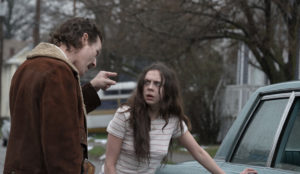 This makes me dissatisfied with the film, which is a disappointment because I like and care about this character, and Richie Merritt as White Boy Rick does a nice job playing him. Guided by a sense that life is ripping him off but feeling empowered to do something about it, Rick is suspicious of his father’s optimistic outlook and unsure what to do about a junkie older sister whom he cares very deeply about.
This makes me dissatisfied with the film, which is a disappointment because I like and care about this character, and Richie Merritt as White Boy Rick does a nice job playing him. Guided by a sense that life is ripping him off but feeling empowered to do something about it, Rick is suspicious of his father’s optimistic outlook and unsure what to do about a junkie older sister whom he cares very deeply about.
Rick Sr. is a licensed gun dealer who operates outside the law. He’s a smart, principled man who may have made a few mistakes as a younger man but who tries to do right for his family now. As role models go, one could probably find a lot worse in 1980s Detroit. Rick Jr. helps his dad with the business, gaining the friendship and trust of a local drug ring. When he’s offered money by the FBI to inform on some of the neighborhood suppliers, he reluctantly accepts the gig, becoming (according to some of the film’s publicity materials) the youngest FBI informant in history at age 14.
 It’s fairly easy to read Rick Sr.’s moral code, but Rick Jr.’s is still being formed. Which of his bad decisions are mere errors in judgment and which are dictated by a slightly skew sense of right and wrong? I’m okay with a movie whose position differs from mine on this, but the movie doesn’t seem to take a position, taking some of the power out of some very good performances.
It’s fairly easy to read Rick Sr.’s moral code, but Rick Jr.’s is still being formed. Which of his bad decisions are mere errors in judgment and which are dictated by a slightly skew sense of right and wrong? I’m okay with a movie whose position differs from mine on this, but the movie doesn’t seem to take a position, taking some of the power out of some very good performances.
I’ve heard some critics say the McConaughssance is over, but the evidence here would suggest otherwise. It’s a solid, sympathetic performance from McConaughey, and I also really like Jennifer Jason Leigh as Rick Jr.’s handler, Brian Tyree Henry (Paper Boy in the excellent FX series Atlanta) as a local Detroit police officer, and Taylour Paige as the wife of the leader of Rick Jr.’s drug-dealing friends.
This film came close to being good.
6/10
64/100

 At first I didn’t quite see what the critics were reporting, that Glenn Close’s performance in The Wife was sure to earn her a nomination for a Best Actress Oscar. Close is pretty much always very good, and this role of Joan Castleman didn’t seem to stretch her at all. Sure, there are some pretty fiery moments where Joan and her husband Joe Castleman argue almost to the point of throwing blows or objects, but this stuff is a cakewalk to someone of Close’s talent.
At first I didn’t quite see what the critics were reporting, that Glenn Close’s performance in The Wife was sure to earn her a nomination for a Best Actress Oscar. Close is pretty much always very good, and this role of Joan Castleman didn’t seem to stretch her at all. Sure, there are some pretty fiery moments where Joan and her husband Joe Castleman argue almost to the point of throwing blows or objects, but this stuff is a cakewalk to someone of Close’s talent. Then there’s the last act of the film, where Joan’s barely controlled fury threatens to blow everything in the room to pieces, and it’s an amazing thing to witness. She is certain to be nominated for best actress, and she’s going to be among the favorites to win.
Then there’s the last act of the film, where Joan’s barely controlled fury threatens to blow everything in the room to pieces, and it’s an amazing thing to witness. She is certain to be nominated for best actress, and she’s going to be among the favorites to win. Joe is informed in the first scene that he is this year’s winner of the Nobel Prize for Literature. The movie then alternates between its present day and the early days of the Castlemans’ relationship. This is a movie about Joan’s role in Joe’s literary career, which includes the raising of two children—a well-adjusted adult daughter and a troubled adult son, who accompanies his parents to Stockholm for the awards ceremony.
Joe is informed in the first scene that he is this year’s winner of the Nobel Prize for Literature. The movie then alternates between its present day and the early days of the Castlemans’ relationship. This is a movie about Joan’s role in Joe’s literary career, which includes the raising of two children—a well-adjusted adult daughter and a troubled adult son, who accompanies his parents to Stockholm for the awards ceremony.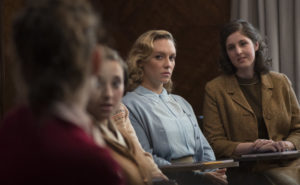 It’s a pretty good story, but the reason to see it is the acting, which is excellent without being especially pyrotechnic. I was really pleased to see Christian Slater as a wanna-be biographer tailing the Castlemans despite their open dislike of him. Slater brings his slimiest best, all the sneaky, sleazy acting that made him a Gen X icon, minus the rebellious self-righteousness. I won’t be surprised if there’s some supporting actor love for him at Oscar time.
It’s a pretty good story, but the reason to see it is the acting, which is excellent without being especially pyrotechnic. I was really pleased to see Christian Slater as a wanna-be biographer tailing the Castlemans despite their open dislike of him. Slater brings his slimiest best, all the sneaky, sleazy acting that made him a Gen X icon, minus the rebellious self-righteousness. I won’t be surprised if there’s some supporting actor love for him at Oscar time.
 Tucker Crowe released one moderately successful album called Juliet and then disappeared. Decades later, his fans dedicate their free time to deconstructing the album and speculating on Crowe’s whereabouts in an online forum run by Duncan Thomson, a college lecturer in a small town in England. Duncan’s live-in girlfriend and the central character in Juliet, Naked is Annie Platt, the curator and director of the town’s museum.
Tucker Crowe released one moderately successful album called Juliet and then disappeared. Decades later, his fans dedicate their free time to deconstructing the album and speculating on Crowe’s whereabouts in an online forum run by Duncan Thomson, a college lecturer in a small town in England. Duncan’s live-in girlfriend and the central character in Juliet, Naked is Annie Platt, the curator and director of the town’s museum.

 Ethan Hawke can be an annoying actor. I find myself demanding he prove his sincerity with every performance, even in those great sequels to Before Sunrise. Here is a film where he mostly wins me over (despite one suspiciously gratuitous piano performance), one of the best roles I’ve seen him in. Byrne has what I think of as the Emily Blunt role, which used to be the Minnie Driver role, but she does it in the sweetest, most relatable way that makes me wish she had more starring vehicles.
Ethan Hawke can be an annoying actor. I find myself demanding he prove his sincerity with every performance, even in those great sequels to Before Sunrise. Here is a film where he mostly wins me over (despite one suspiciously gratuitous piano performance), one of the best roles I’ve seen him in. Byrne has what I think of as the Emily Blunt role, which used to be the Minnie Driver role, but she does it in the sweetest, most relatable way that makes me wish she had more starring vehicles.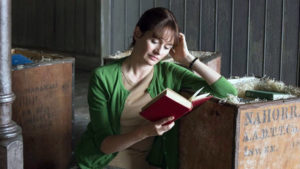 Florence Green is a middle-aged widow living in a very damp coastal English town. She opens a bookshop, despite reservations by (and condescending advice from) supposedly smarter men like her banker and her solicitor, and despite strong discouragement from Violet Gamart, an elder socialite who envisions a community arts center in the space Florence purchases for her shop.
Florence Green is a middle-aged widow living in a very damp coastal English town. She opens a bookshop, despite reservations by (and condescending advice from) supposedly smarter men like her banker and her solicitor, and despite strong discouragement from Violet Gamart, an elder socialite who envisions a community arts center in the space Florence purchases for her shop. A smart, young farm girl works for Florence after school, and the two ladies form a nice mentor-apprentice relationship. A wealthy recluse (played by Bill Nighy, one of my favorites) is one of her steadiest clients, and the bookshop seems to take hold in its little corner of this town among other residents as well, but Violet still wants her arts center.
A smart, young farm girl works for Florence after school, and the two ladies form a nice mentor-apprentice relationship. A wealthy recluse (played by Bill Nighy, one of my favorites) is one of her steadiest clients, and the bookshop seems to take hold in its little corner of this town among other residents as well, but Violet still wants her arts center. Riley North witnesses the horrible murder of her husband and young daughter. A crooked system lets the perpetrators get off with no punishment, so Riley disappears for a few years, showing up in time to commemorate the fifth anniversary of the murder, but this time with Jason-Bourne-like skills. And she’s not back to offer second chances.
Riley North witnesses the horrible murder of her husband and young daughter. A crooked system lets the perpetrators get off with no punishment, so Riley disappears for a few years, showing up in time to commemorate the fifth anniversary of the murder, but this time with Jason-Bourne-like skills. And she’s not back to offer second chances. A movie like this is pretty much review-proof. It’s Jennifer Garner in badass mode, as she was in her Alias TV program. I was aware of its terrible reviews before I went in, but whatever. It’s Jennifer Garner.
A movie like this is pretty much review-proof. It’s Jennifer Garner in badass mode, as she was in her Alias TV program. I was aware of its terrible reviews before I went in, but whatever. It’s Jennifer Garner. I dislike the concept of a vigilante, but I do enjoy vigilante movies, and how many have female leads? Seriously, you can put Riley right up there with any of them. I like her better than Charles Bronson in Death Wish or Clint Eastwood in those westerns. I don’t care that there is nary an explanation to be found for her quickly attained super-amazing death-machine skills. I just want more Peppermint.
I dislike the concept of a vigilante, but I do enjoy vigilante movies, and how many have female leads? Seriously, you can put Riley right up there with any of them. I like her better than Charles Bronson in Death Wish or Clint Eastwood in those westerns. I don’t care that there is nary an explanation to be found for her quickly attained super-amazing death-machine skills. I just want more Peppermint. Searching is the second movie I’ve seen in September 2018 that’s marketed as a thriller but is really a mystery. So if you are not thrilled by thrillers (as I am not), don’t let the trailer keep you away. There are a couple of dark episodes, but the film stays away from edge-of-your-seat suspense or immediate peril for the main character. The main character’s teenaged daughter disappears and may be dead, and very sensitive parents may wish to skip it for this reason, but even with this major plot element, the film is really not at all scary.
Searching is the second movie I’ve seen in September 2018 that’s marketed as a thriller but is really a mystery. So if you are not thrilled by thrillers (as I am not), don’t let the trailer keep you away. There are a couple of dark episodes, but the film stays away from edge-of-your-seat suspense or immediate peril for the main character. The main character’s teenaged daughter disappears and may be dead, and very sensitive parents may wish to skip it for this reason, but even with this major plot element, the film is really not at all scary. Some viewers, however, may find it gimmicky. The entire movie is seen on electronic screens of some sort, usually computer screens and smartphone screens. Even when we’re looking at live news reports, we see them not on television, but via streaming through a web browser. There’s a good reason for the gimmick, and although this device forces the filmmakers to resort to some unrealistic exposition by way of news reporters who say things they would never say (and televise things they would never televise), it’s worth this bit of tradeoff for the social issues they explore. In this way, Searching is not a bad partner for Eighth Grade.
Some viewers, however, may find it gimmicky. The entire movie is seen on electronic screens of some sort, usually computer screens and smartphone screens. Even when we’re looking at live news reports, we see them not on television, but via streaming through a web browser. There’s a good reason for the gimmick, and although this device forces the filmmakers to resort to some unrealistic exposition by way of news reporters who say things they would never say (and televise things they would never televise), it’s worth this bit of tradeoff for the social issues they explore. In this way, Searching is not a bad partner for Eighth Grade.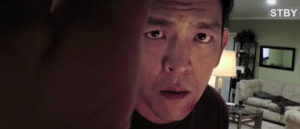 Cho is David Kim, the recently widowed father of Margot, a high-achieving high-school senior. Margot disappears one night when she’s supposed to be at a study group. As police detective Rosemary Vick (Debra Messing) and her team trace the evidence, they ask David to contact all of Margot’s friends to try and figure out where she might have gone. The more David looks, the clearer it is that he really doesn’t know his daughter.
Cho is David Kim, the recently widowed father of Margot, a high-achieving high-school senior. Margot disappears one night when she’s supposed to be at a study group. As police detective Rosemary Vick (Debra Messing) and her team trace the evidence, they ask David to contact all of Margot’s friends to try and figure out where she might have gone. The more David looks, the clearer it is that he really doesn’t know his daughter. A Simple Favor is being marketed as a thriller, but it’s really more of a mystery, so if you’re put off by thrillers (as I am), be assured that it’s not very scary and not very violent, and it doesn’t have edge-of-your-seat moments the way thrillers usually do.
A Simple Favor is being marketed as a thriller, but it’s really more of a mystery, so if you’re put off by thrillers (as I am), be assured that it’s not very scary and not very violent, and it doesn’t have edge-of-your-seat moments the way thrillers usually do.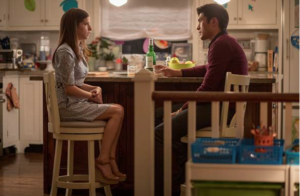 She meets Emily, the beautiful mother of her son’s classmate. Stephanie and Emily become friends, but for Stephanie it’s a very uneasy friendship. Emily is wealthier, more successful, and more adventurous than she is, and where Stephanie is eager to please and quick to apologize, Emily seems to disdain any attitude that doesn’t begin with oneself. She admonishes Stephanie for saying “I’m sorry,” and threatens to punch her in the face if Stephanie ever says it again.
She meets Emily, the beautiful mother of her son’s classmate. Stephanie and Emily become friends, but for Stephanie it’s a very uneasy friendship. Emily is wealthier, more successful, and more adventurous than she is, and where Stephanie is eager to please and quick to apologize, Emily seems to disdain any attitude that doesn’t begin with oneself. She admonishes Stephanie for saying “I’m sorry,” and threatens to punch her in the face if Stephanie ever says it again. It’s fun in the way a good puzzle mystery is fun, engaging all the way and difficult to predict. Every character seems at times likeable and despicable, with nice performances by Kendrick, Lively, and Henry Golding as Sean, Stephanie’s husband.
It’s fun in the way a good puzzle mystery is fun, engaging all the way and difficult to predict. Every character seems at times likeable and despicable, with nice performances by Kendrick, Lively, and Henry Golding as Sean, Stephanie’s husband.
